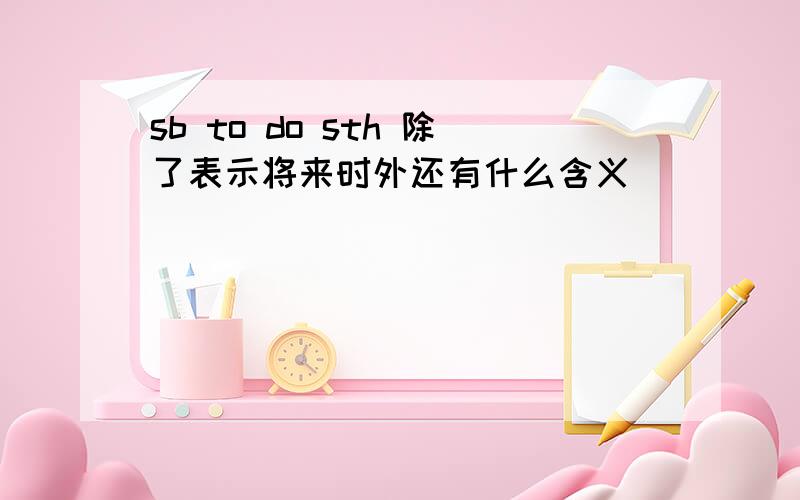sb to do sth 除了表示将来时外还有什么含义
来源:学生作业帮助网 编辑:作业帮 时间:2024/08/05 04:41:42

sb to do sth 除了表示将来时外还有什么含义
sb to do sth 除了表示将来时外还有什么含义
sb to do sth 除了表示将来时外还有什么含义
sb to do sth 单独不能表示什么,必须在前面加上动词,才能算是固定短语的用法.比如 make sb to do sth,使某人做某事;ask sb to do sth,要求/命令某人去做某事.
你说的表示将来时的 应该是“be to do”这个结构吧.一般说来两种语法意义,一是系动词be+动词不定式做表语,二是be to作为固定用法,具有情态含义,可以把它叫做情态习语(modal idiom).
一、be +动词不定式,不定式做表语,表示主语和表语在概念上等同.如:
The problem is to find a solution.问题是找到一个解决方法.
His plan is to clean the room.他的计划是打扫房间.
My wish is to be a doctor.我的希望是做一个医生.
二、be to作情态习语,这时的be to do表示:“计划”、“安排”、“义务”、“应该”、“可能”、“命运”等.(have to,ought to).
1.表示“将”、“计划”、“安排”.(意思接近于be going to)如:
He is to have a holiday.
Their daughter is to get married soon.
The committee is to meet today.
After dinner they were to go to a movie.
was/ were to do表示过去曾经计划要做的事,或者过去应当做的事,而且从现在的角度来看已经实现了.如:
I felt nervous because I was soon to leave home for the first time.
The expedition was to start in a week’s time.
was/ were to have done,表示“本打算”、“本计划”或“本应当”做的事而没有做成或没有发生.如:
I was to have seen him last Wednesday,but he didn’t come.
We were to have been married last year.
2.表示“义务”、“应该” .(意思接近于should,must,ought to,have to)如:
No one is to leave the building.谁也不得离开这楼房.
You are not to smoke in this room.=You are not supposed to smoke in this room.
You are to be back by 10 o’clock.你必须十点以前回来.
3.表示可能性,相当于can,may如:
Such books are to be found in the library.这样的书在图书馆里就能找到.
Not a single sound was to be heard.一点儿声音也听不到.
Not a soul was to be seen.看不到一个人影.
5.表示“命运”,将来必然要发生的事,译作“注定……”.如:
The worst is still to come.
They said goodbye,little knowing they were never to meet again.
6.用于“if…were to do”,表示虚拟语气.如:
If it were to rain tomorrow,the sports meeting would be put off.如果明天下雨,运动会就会延期.